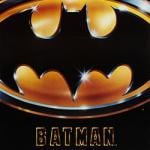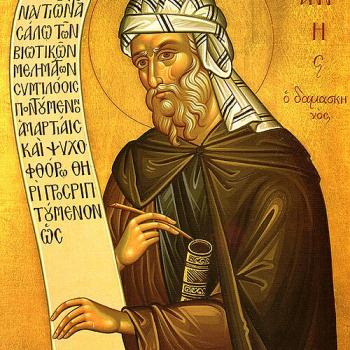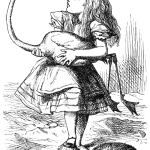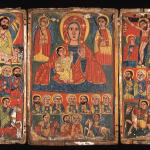Going to mass and receiving the sacraments, reading the scriptures and engaging in prayer helps prepare our hearts and minds and feeds our souls with the presence of God. We can then take the spirit of God dwelling in our soul and use it to see everywhere in God’s creation which reflects the truth, beauty and goodness everywhere one goes. It sees God clearly in the strictly religious activities we engage in as Christians and it can see God in the secular aspects of life as well.
160 years ago marked not only the end of the civil war but the publication of an enduring fantasy classic which has never declined in popularity. July 31, 2025, the feast day of St. Ignatius of Loyola and the day it was announced that St. John Henry Newman would become a Doctor of the Church was the day the kids at the Immaculate Conception summer camp program run by the Immaculate Conception school located next to the Immaculate Conception church put on a production of Alice in Wonderland Jr. It was a marvelous production that was put together and performed in just 2 weeks by a talented group of young actors. They had 3 actresses portraying Alice in different sizes, the Cheshire Cat consisted of 3 actors and the Caterpillar had 6 girls playing the one bug. It was a fun production that taught the kids the value of art and teamwork. And right before the show started one of the guys in charge led the audience in a prayer and we recited the Lord’s Prayer together. We took a secular mainstream play and sanctified the experience by thanking God for the gift of art.
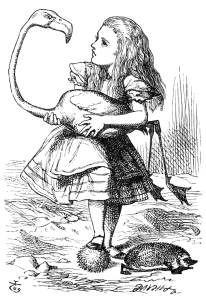
Artists of the world, may your many different paths all lead to that infinite Ocean of beauty where wonder becomes awe, exhilaration, unspeakable joy.
St. Pope John Paul II –Letter to Artists, (April 4, 1999)
So why did the school not put on a small production of the Chosen or the life of a saint? Shouldn’t a Catholic school put on a strictly Catholic production?
Obviously, prayer, devotional reading, and service are very necessary and worthwhile acts, and certainly God doesn’t want us spending all our free time seeking entertainment and amusement. But neither does he require or wish all Christians to spend all their spare time in the pursuit of expressly religious and charitable works. Play, recreation, and amusement are also pleasing to him. He created us to enjoy them, and it is not only concupiscent sloth that attaches us to them. Of course sloth may incline us to inordinate attachment to diversion, just as concupiscence may inordinately attach us to any finite good (food, alcohol, comfort, work, sleep, sex, and so on). But the thing itself, and its proper enjoyment, remains per se good.
God created us for play and amusement just as he created us for work, prayer, and community. In particular he created us for art and culture: to create and look at images; to fashion stories and music and dance, and to perform and enjoy them; to explore imaginative scenarios of good and evil, of conflict and resolution.
-Deacon Steven D. Greydanus —What Are the Decent Films? – Decent Films
If you listen to SQPN (The Star Quest Pod-Casting Network) you will find programs of faith mixed in with shows about Star Trek and technology. One of the SQPN shows, Jimmy Akin’s Mysterious World, talks about Bigfoot and apparitions of the Virgin Mary. C.S. Lewis wrote about a wardrobe that opened into another universe with a Lion that symbolized Christ and also wrote strictly Christian apologetic works. Deacon Steve writes movie reviews, about comics and shares his Sunday homilies on his substack blog. Because all truth is God’s Truth and all Beauty is God’s Beauty and all Goodness is God’s Goodness you can always look at, read, watch and listen to
Whatever is true, whatever is honorable, whatever is right, whatever is pure, whatever is lovely, whatever is commendable, [and] if there is any excellence and if anything worthy of praise, [we can] think about these things.-Philippians 4:8
One of the biggest franchises of the 20th and 21st century is The Lord of the Rings by J.R.R. Tolkien. It is another fantasy classic with trolls, goblins, wizards, powered rings, invisibility, big battles, an army of the dead and a new unfamiliar race of creatures not previously depicted in folk and fairy tales known as Hobbits. The author (who was friends with Narnia creator C.S. Lewis) described LOTR as “a fundamentally religious and Catholic work”, even though it is not a book filled with overt Christian symbolism.
But it’s true that there is virtually no sign of religious behavior or institutions. Neither among hobbits, dwarves, elves or men do we see priests, temples, sacrifice, liturgical rituals, or other religious behavior. From The Silmarillion we know that Middle-earth was created by Eru Ilúvatar, but no one in The Lord of the Rings prays to him or invokes him. (Shameless name-drop: I believe the person who first explicitly pointed this out to me was, um, Ian McKellen.) In fact, Tolkien himself, in characterizing The Lord of the Rings as “a fundamentally religious and Catholic work,” went on to say:
I have not put in, or have cut out, practically all references to anything like “religion,” to cults or practices, in the imaginary world. For the religious element is absorbed into the story and the symbolism.
Tolkien was right to call The Lord of the Rings “fundamentally religious and Catholic.” And he was also right to recognize that in order to make it “fundamentally religious and Catholic” in the way he wanted it to be, it was necessary to exclude virtually any sign of explicit religiosity.
-Deacon Steven D. Greydanus – Why is there no religion in The Lord of the Rings? – Decent Films
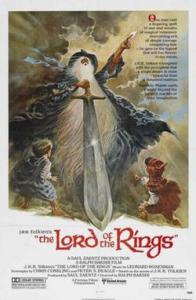
Christians don’t always have to produce strictly Christian art.
Non-Christian don’t always produce strictly non-Christian art.
Director Pier Paolo Pasolini. made the film The Gospel According to St. Matthew (1964). In 2015, the Vatican City newspaper L’Osservatore Romano called it the best film on Christ ever made. It was ranked number 10 (in 2010) and number 7 (in 2011) in the Arts and Faith website’s Top 100 Films, also is in the Vatican’s list of 45 great films and Roger Ebert‘s Great Movies list. He was also openly gay and became an avowed Marxist shortly after the end of World War II. As a young adult, Pasolini identified as an atheist. Yet this gay Marxist atheist made a very overt Catholic Christian film. Something was at work in him.
Some of the most intriguing artistic tributes to faith and religion come from nonbelievers. A Man For All Seasons, the great drama of the life and martyrdom of St. Thomas More, was written for the stage and screen by the non-Christian Robert Bolt. The story of The Song of Bernadette, the Marian visionary of Lourdes, was first written as a historical novel by a Jewish author, Franz Werfel. And Mark Twain’s favorite work among all his books was his Joan of Arc.
Pier Paolo Pasolini was an atheist, indeed a Marxist, and his The Gospel According to Matthew is routinely interpreted as a proto-Marxist allegory. Yet Pasolini was perhaps first of all a poet, and the concepts of the sacred and the divine, far from repelling him as so much religious superstition, held for him a powerful appeal. In 1962 he came to Assisi in response to Pope John XXIII’s call for dialogue with non-Christian artists. While there, he read through a book of the Gospels “from beginning to end, like a novel,” later proclaiming the story of Jesus “the most exalting thing one can read.
-Deacon Steven D. Greydanus –The Gospel According to St. Matthew (1964) – Decent Films
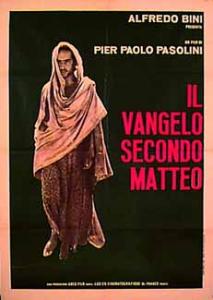
You can have no faith in God and yet make a good piece of art about God that inspires faith.
You can be a faith-filled believer and make a good non-faith piece of art that latently reflects God.
C.S. Lewis summed this all up in this neat little passage.
“I believe that any Christian who is qualified to write a good popular book on any science may do much more by that than by any direct apologetic work…. We can make people often attend to the Christian point of view for half an hour or so; but the moment they have gone away from our lecture or laid down our article, they are plunged back into a world where the opposite position is taken for granted…. What we want is not more little books about Christianity, but more little books by Christians on other subjects—with their Christianity latent.You can see this most easily if you look at it the other way around. Our faith is not very likely to be shaken by any book on Hinduism. But if whenever we read an elementary book on Geology, Botany, Politics, or Astronomy, we found that its implications were Hindu, that would shake us. It is not the books written in direct defense of Materialism that make the modern man a materialist; it is the materialistic assumptions in all the other books. In the same way, it is not books on Christianity that will really trouble him. But he would be troubled if, whenever he wanted a cheap popular introduction to some science, the best work on the market was always by a Christian.”
-C.S. Lewis (God in the Dock: Essays on Theology and Ethics)
A play not about the faith, like Alice in Wonderland, can be enjoyed and celebrated by those of the faith because it reflects those elements of God that everyone has access to regardless of religious faith or belief, which is truth, beauty and goodness. This is why I as a Catholic blogger I can and do write about non-Catholic things but always have my Catholic glasses on when I do.
The most powerful concept that occurred to me was that I am an actual member of the body of Christ and can participate with him in the transformation of the world…. Because I am a member of the body of Christ I am more aware of my own dignity and also of the presence of God in all people and all things.
-William A.Barry Finding God in All Things: A Companion to the Spiritual Exercises of St. Ignatius: Companion to the Spiritual Exercises of St.Ignatius (2009) Ave Maria Press


